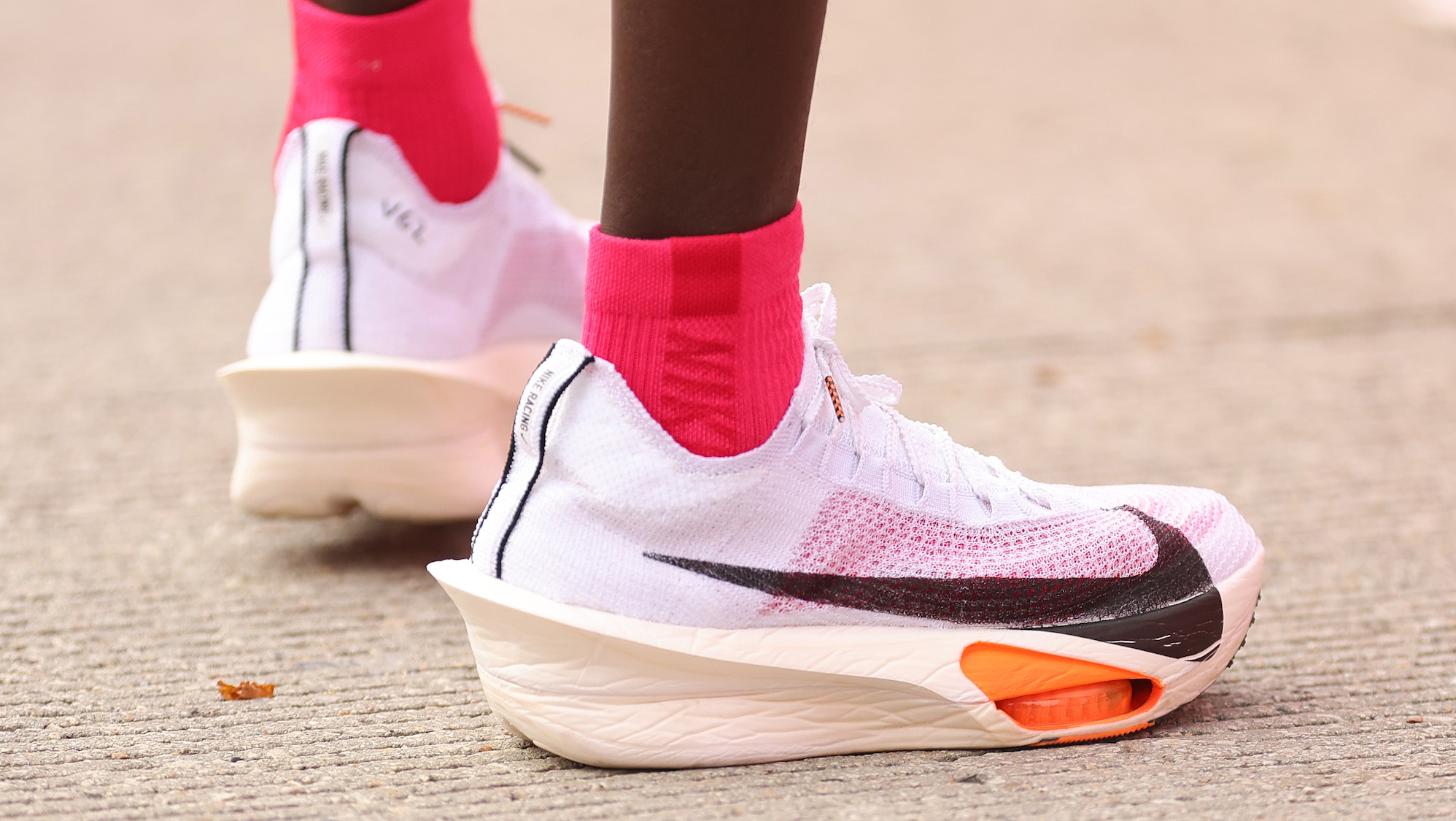The super-shoes behind the race to break the two-hour marathon
A race between major sports manufacturers has seen marathon times get increasingly faster

A free daily email with the biggest news stories of the day – and the best features from TheWeek.com
You are now subscribed
Your newsletter sign-up was successful
In the space of just two weeks the men's and women's marathon world records have been taken to previously unimaginable heights.
The men's record is edging ever closer to breaking the two-hour barrier, with Kenya's Kelvin Kiptum setting a new record of 2:00:35 at the Chicago Marathon last Sunday, shaving 34 seconds off the record held by his compatriot Eliud Kipchoge. The women's record, meanwhile, was broken by more than two minutes, as Ethiopia's Tigst Assefa ran 2:11:53 at the Berlin Marathon at the end of September.
But in light of the incredible times that are now beginning to appear more regularly, the "main topic of conversation is not the athletes", said the BBC, but the "role played by 'super-shoes'".
The Week
Escape your echo chamber. Get the facts behind the news, plus analysis from multiple perspectives.

Sign up for The Week's Free Newsletters
From our morning news briefing to a weekly Good News Newsletter, get the best of The Week delivered directly to your inbox.
From our morning news briefing to a weekly Good News Newsletter, get the best of The Week delivered directly to your inbox.
A "super shoe war" has been "bubbling since 2016", said Ali Ball in Runner's World, with major manufacturers including Nike and Adidas attempting to better each other, and there is "no sign of a ceasefire just yet". There are fears, however, that marathon racing has "become as much a battle of technology as endurance".
What are super-shoes?
The super-shoes are high-performance running shoes designed with a combination of "carbon, foam, height and reduced weight" to make them as fast as possible, said Jeremy Wilson in The Telegraph.
The carbon footplate within the shoe creates an "optimum rocking motion”, which is "believed to make the foot roll more efficiently off the toes". However, a light and thick midsole foam is where "most of the energy is actually optimised". All super-shoes are made with as little upper material as possible to make them lighter, with research suggesting "a saving in weight of 100 grams can equate to one per cent of energy" and usually "up to or close to" the 40mm stack height limit for road shoes, added Wilson.
They first shot to prominence in 2016 with the release of the Nike Vaporfly 4%. And Nike athletes have "dominated the marathon" ever since, taking "31 of the 36 podium places in the six marathon majors” in 2019, while the company has "reaped the financial rewards", said Sean Ingle in The Observer. Tests from those initial shoes suggested they "increase an athlete's running efficiency by approximately 4%", compared to regular marathon shoes, added The Guardian’s Linda Geddes.
A free daily email with the biggest news stories of the day – and the best features from TheWeek.com
Why are they controversial?
Athletes are no doubt making physiological improvements through training and nutritional science, but "marathons are becoming as much about brands as they are the runners", said the BBC. The major brands are "battling" to be involved with whoever officially breaks "the magic two-hour mark".
But many argue that "super shoes obviously significantly aid performance" given the marked improvements in times in recent years, said Runner's World. And former Olympic runner Tim Hutchings told The Telegraph that record-setting was now a "devalued currency" because of "the big differences made by shoe tech". Another unnamed retired runner told the paper that the current trend was "unsustainable and to me world records now are meaningless".
The "ethical questions" around super-shoes "prompt sharply diverging opinions", with many suggesting companies should be allowed to push the boundaries of technology as has happened in other sports. How these shoes work and are "quite so effective remains a closely guarded secret", said The Times, and brands know "that record-breaking runs lead to a significant spike in sales in the amateur running market".
There are some limited rules and regulations set down by the governing body World Athletics on shoes, restricting stack height and certain technologies within the shoe, for example, but largely companies have room to develop their products. The most controversial rule, argued Runner's World, is the decree that "the shoe must be available for purchase by competitors" and "have been available for purchase for at least one month" before being used in competition.
Do they work for amateur runners?
The rise of super-shoes has "correlated with a total rewrite of athletics records from the 5,000m upwards", not just marathons, wrote Wilson. They are now "widely available to the general public" and many amateur runners are happy to accept the high price-tag – anywhere from £200 to £400. While there is a "sacrifice in durability" for the performance gains, the shoes are "now common in every sort of running event from local parkruns up to the most elite championship races".
There will be varying benefits for amateur runners, though. Some research suggests "that the shoes do more for you, the faster you run”, said The Washington Post, meaning slower runners may not get the maximum out of super-shoes. However, a similar study said "being in a super shoe can give runners a mental boost" and increase performance.
Richard Windsor is a freelance writer for The Week Digital. He began his journalism career writing about politics and sport while studying at the University of Southampton. He then worked across various football publications before specialising in cycling for almost nine years, covering major races including the Tour de France and interviewing some of the sport’s top riders. He led Cycling Weekly’s digital platforms as editor for seven of those years, helping to transform the publication into the UK’s largest cycling website. He now works as a freelance writer, editor and consultant.